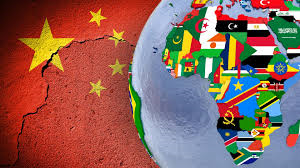How should African civil societies respond to the growing influence of China in their countries’ political systems? By Hugo Keji

African civil societies face a complex challenge in responding to China's growing influence in their countries' political systems, as China's engagement in Africa is multifaceted, involving investment, infrastructure, trade, and diplomatic relations. To address this, civil society groups should consider a strategy that is balanced, informed, and rooted in the interests of African citizens.
Here are key ways civil societies could respond:
1. Advocate for Transparency and Accountability
African civil societies can push for greater transparency and accountability in dealings between African governments and Chinese entities. This includes:
- Public Disclosure of Agreements: Urging governments to make contracts and terms of engagement with Chinese businesses and government agencies public, particularly concerning loans, infrastructure projects, and natural resource concessions.
- Anti-corruption Measures: Ensuring that projects funded by China or involving Chinese firms follow anti-corruption measures and meet standards for transparency in project implementation.
2. Promote Good Governance
Civil society can play a crucial role in advocating for governance practices that benefit African citizens:
- Democratic Participation: Pressing for democratic processes and citizen involvement in decision-making related to foreign policy, especially with regards to China’s role in politics and economic partnerships.
- Preventing Elite Capture: Monitoring that China's influence does not lead to elite capture, where a small group of political or economic elites benefit disproportionately while the general population is marginalized.
3. Raise Public Awareness
Civil society organizations can engage in education and advocacy efforts to ensure that the public understands the implications of China’s growing influence:
- Media Campaigns: Engaging in campaigns that educate the public on both the positive and negative aspects of China's role in Africa, allowing for more informed discussions and decision-making.
- Independent Research: Producing and disseminating research on the impact of Chinese investments, loans, and political engagements on local economies, governance, and social systems.
AfriPrime App link: FREE to download...
https://www.amazon.com/Africircle-AfriPrime/dp/B0D2M3F2JT
4. Strengthen Regional and International Collaboration
African civil societies can collaborate across borders and with international organizations to create stronger collective responses to Chinese influence:
- Pan-African Advocacy Networks: Working together across countries to develop unified positions on how to handle China’s involvement in Africa’s political systems, ensuring that Africa speaks with a collective voice in negotiations with China.
- Engagement with International Organizations: Partnering with global organizations that focus on governance, human rights, and development to gain support and create pressure for fairer and more sustainable engagements with China.
5. Focus on Developmental Outcomes
Civil societies can ensure that the focus of Chinese investments and political engagement is on sustainable, people-centered development:
- Environmental and Social Safeguards: Advocating for projects to include strong environmental and social protections, ensuring that Chinese investments do not lead to ecological degradation or human rights abuses.
- Skills Transfer and Job Creation: Pressuring governments to ensure that Chinese investments result in local employment and skill development for African workers, not just reliance on Chinese labor or technology.
6. Promote Strategic Partnerships
Rather than rejecting China's influence outright, civil societies can promote partnerships that are more beneficial to African countries:
- Diversification of Partnerships: Advocating for African governments to engage with a variety of international partners, including Europe, the U.S., and other regions, to avoid overdependence on China.
- Negotiating Fairer Deals: Encouraging African governments to negotiate more equitable deals with China that prioritize local interests, ensuring mutual benefit.
7. Defend Human Rights
Some civil society groups in Africa have raised concerns about how China’s political influence might affect governance, especially with respect to human rights and political freedoms:
- Freedom of Expression and Rights: Advocating for the protection of civil liberties and warning against authoritarian practices or surveillance technologies that might be adopted from China, which could undermine human rights.
- Legal Reforms and Monitoring: Strengthening local legal frameworks to prevent the erosion of rights and pushing back against practices that could harm democratic institutions.
In sum, African civil societies should not approach China's growing influence with a simple rejectionist stance, but rather with a nuanced, proactive approach that emphasizes transparency, good governance, and development outcomes that benefit the broader population.
AfriPrime App link: FREE to download...
- Questions and Answers
- Opinion
- Story/Motivational/Inspiring
- Technology
- Art
- Causes
- Crafts
- Dance
- Drinks
- Film/Movie
- Fitness
- Food
- Games
- Gardening
- Health
- Home
- Literature
- Music
- Networking
- Other
- Party
- Religion
- Shopping
- Sports
- Theater
- Wellness
- News
- Culture
- War machines and policy

